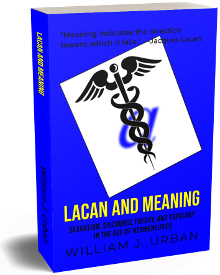LACAN AND MEANING
SEXUATION, DISCOURSE THEORY, AND TOPOLOGY IN THE AGE OF HERMENEUTICS
CHAPTER 2
WITHDRAWALS FROM MEANING
— page 37 —
The subject-side is emphasized to an even greater degree in the earlier Geneva School of phenomenological criticism which flourished in the 1940s–50s. Having roots with Ingarden as well, its methodology is perhaps best illustrated with the phenomenology of reading carried out by its most well-known member, Poulet. Already in the first moment Poulet problematizes the text qua object. The book lying on the table appears as no other. It seems almost aware of its potential to existentially transform when picked up and read. And Poulet does just that, taking his own reader through a first-person account of phenomena encountered along the way. At once the book loses another aspect of objectivity, as it appears to emit from its pages the consciousness of a rational being. This is the author’s mind for classical hermeneuts and likewise, mutatis mutandis, for Geneva School phenomenologists who generally seek to coincide subjectivities through textual objects. But Poulet does not presume beyond the text before him. He seeks instead a pure identification with this consciousness. As he continues to read, this consciousness slowly opens up and allows him to think its thoughts. Suddenly he realizes these thoughts are objects of his own thought. It is as if he were invaded by some strange and indeterminate entity. But far from excising the foreign invader, Poulet encourages an alliance by clearing its path of remaining textual objects. In the end, a pure consciousness is seen to preside over the meaningful unfolding of the literary work.
Poulet’s endeavor to apprehend a subjectivity without objectivity seems to disqualify him from the Husserlian interpretive camp. As Ingarden and Iser exemplify, to consider the literary work as concretized, both sides of the subject-object schema must be deployed. Against this background, trying to get by with just one side appears rather short-sighted. But then again, Poulet stands quite close to Husserl. As already stated, phenomenology broke with epistemological strategies of the past by insisting that meanings come already objectively known to consciousness. So while demonstrating the constitution of the aesthetic object meant through the convergence of reader and text is certainly helpful, Poulet’s own strategy to lend this emerging object a subjective voice is equally so. For it underscores how meanings are not idealities ‘up there’ but instead closely aligned with the conscious acts of subjects taking aim at external objects like texts. From the perspective of discussions untaken below, however, Poulet’s value lies in having discerned something foreign to thought contemplating textual matters. It will be seen that despite this phenomenon’s association with meaning, it is best understood to subsist outside its field. The further suspicion that it nevertheless retains ties to the subject will be amply confirmed by the work of Lacan.
« prev next »full text of Lacan and Meaning
FREE Lacanian-themed puzzles

